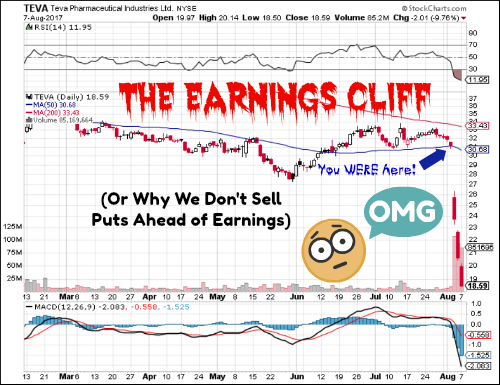Selling Puts Into Earnings
(Part 1 of 3)
Why I Don't Initiate a New Short Put Position Ahead of an Earnings Release
I love those studies that talk about the health benefits of drinking alcohol because I find them funny in a way.
Like this one that suggests regular drinkers being less likely to develop dementia.
My favorite quote from the article above:
Researchers found that among men and women 85 and older, those who consumed "moderate to heavy" amounts of alcohol five to seven days a week were twice as likely to be cognitively healthy than non-drinkers.
"Moderate to heavy?" That's a pretty wide range.
In my experience, there are only two types of drinkers - those who drink too much, and those who don't drink at all (I'll let you guess which type I am, but here's a hint - if there's any truth to the study above, I'll still be sharp as a tack until the bitter end).
It seems to me that there are enough conflicting studies out there involving alcohol that you can find whatever evidence you want to support your current lifestyle - whether you're a teetotaler or a fall down drunk.
There's a fine line between medicine and poison. The things that can heal us or make our lives better are also the things that can destroy us - and vice versa.
And the same can be said when it comes to option trading and earnings season.
You Can Make a Lot of Money Selling Puts Into Earnings
Obviously, there's a lot more money on the table selling options - naked calls and covered calls alike - during earnings season.
The amount of option premium available is determined by the implied or expected volatilty of a stock, and an upcoming earnings release is one of those events that heightens the uncertainty in a stock.
There can be a case made for selling options into an earnings release. For example, if you have a strong conviction of a specific earnings surprise, or if you feel you can exploit implied volatility levels that have gotten too high, you may be perfectly justified trading earnings season.
But in this article, I'm going to make the case for why I almost always avoid initiating a new short put position that has exposure to an earnings release.
Avoiding New Option Trades Ahead of Earnings
For the most part then, I avoid initiating a new short put position (or a new covered call position for that matter) if the holding period is going to include a company's earnings release.
That's not to say that I 100% forbid myself from selling puts at earnings.
Some stocks - something stable and high quality like KO (Coca-Cola), for example - I'd be perfectly comfortable establishing a new short put position during earnings season.
But there would need to be other factors - valuation, technicals, special situations, etc. - that would also need to be considered.
But, as I say, in general, I avoid it.
So What's So Bad About Selling Puts Into Earnings?
In two words - uncertainty and catalyst.
A company's quarterly earnings release and corresponding earnings conference call contain two elements of uncertainty
- What the business's financial numbers were over the previous three months; and
- Forward guidance provided by management
And until that information is released, you and I have no special insights into what that information is going to reveal.
Regardless of whether that information is ultimately positive for the stock or negative for the stock, what's most important is that it's a potential catalyst.
Mr. Market Loves to Reassess and Re-evaluate
The current share price of a stock represents, at any given moment, Mr. Market's views and assessments of the value and prospects of a specific business.
Yes, there's always elements of irrationality and psychology in there.
But there's logic and rationality in there as well.
Mr. Market loves to reassess and re-evaluate his views on a stock - but in order to do that, he needs new information, a catalyst if you will.
Sometimes there might be something that comes out of the blue - a surprise acquisition, the CEO getting arrested, some peripheral report with industry wide implications.
But for the most part, Mr. Market has to wait for three months to parse through a company's reported quarterly numbers to get a fresh view on the business.
Mr. Market the Auditor
That's how I view earnings season then - Mr. Market gleefully auditing thousands of publicly traded companies in order to update how he sees their present and future value.
Most of the time, Mr. Market's audit leads him to reconfirm his previous views - or only update them moderately.
But there are other times when he VIOLENTLY re-assesses.
Case in point - check out what happened to TEVA in August of 2017 following one of Mr. Market's reassessments:
And because we don't have any special insights into which stocks are going to be violently re-assessed, or in what direction, it just seems foolhardy to throw ourselves on the tracks when we don't have to.
In the case of TEVA, not only had the generic drug making landscape been very competitive during this time period, but TEVA has also been struggling with their own management issues.
And when the company reported disappointing results, Mr. Market was not very understanding in the least.
Mr. Market is NOT a gentle giant.
The stock went from the low $30s to below $20 in the blink of an eye.
Are You Really Supposed to Avoid Earnings the Rest of Your Life?
So is it realistic to think that option traders can avoid all exposure to earnings releases?
What if you're already in a trade and it needs to be repaired?
Ah, now that's a different situation.
It's one thing to avoid new trades into an earnings release, but once you're already in a trade, and you can no longer avoid earnings, that's the time to use the earnings calendar to your advantage.
And in Part 2 of our series, we'll cover how to use earnings to manage and repair a short put trade.
Tweet
Follow @LeveragedInvest
HOME : Naked Puts : Selling Puts Into Earnings

>> The Complete Guide to Selling Puts (Best Put Selling Resource on the Web)
>> Constructing Multiple Lines of Defense Into Your Put Selling Trades (How to Safely Sell Options for High Yield Income in Any Market Environment)
Option Trading and Duration Series
Part 1 >> Best Durations When Buying or Selling Options (Updated Article)
Part 2 >> The Sweet Spot Expiration Date When Selling Options
Part 3 >> Pros and Cons of Selling Weekly Options
>> Comprehensive Guide to Selling Puts on Margin
Selling Puts and Earnings Series
>> Why Bear Markets Don't Matter When You Own a Great Business (Updated Article)
Part 1 >> Selling Puts Into Earnings
Part 2 >> How to Use Earnings to Manage and Repair a Short Put Trade
Part 3 >> Selling Puts and the Earnings Calendar (Weird but Important Tip)
Mastering the Psychology of the Stock Market Series
Part 1 >> Myth of Efficient Market Hypothesis
Part 2 >> Myth of Smart Money
Part 3 >> Psychology of Secular Bull and Bear Markets
Part 4 >> How to Know When a Stock Bubble is About to Pop



